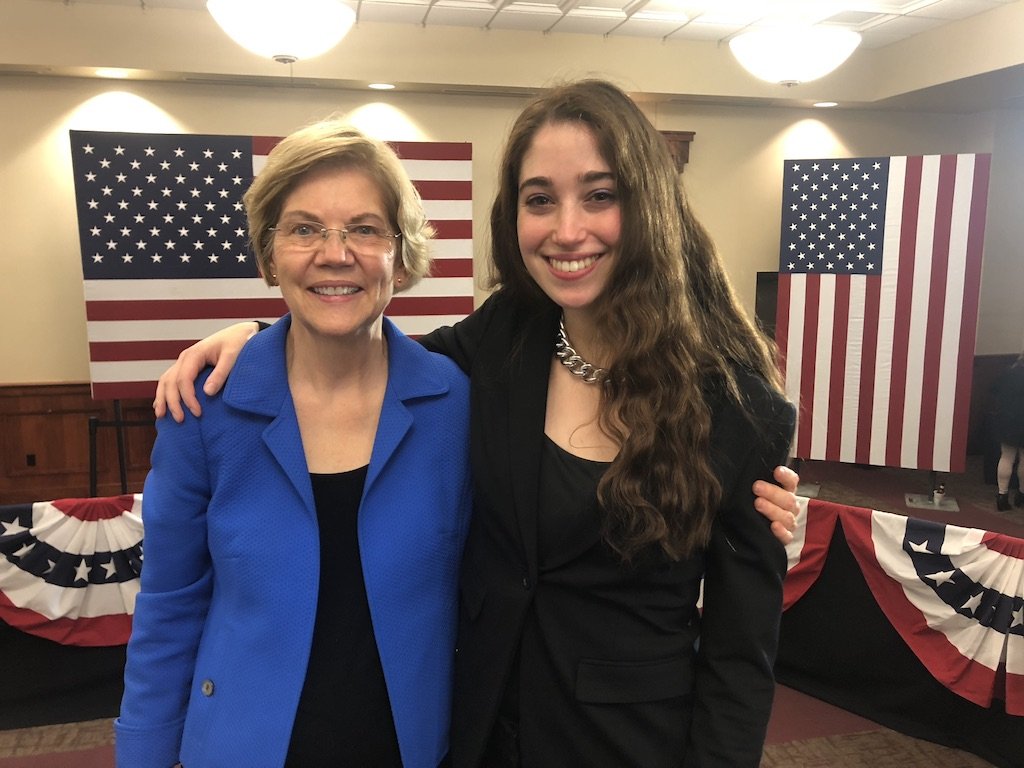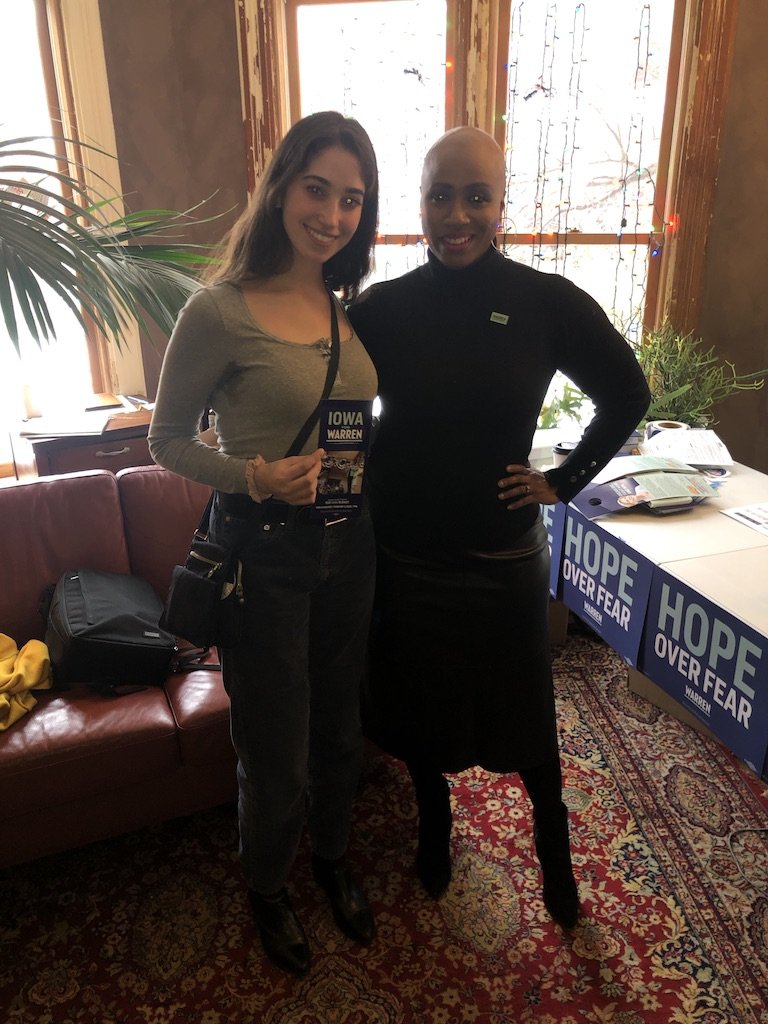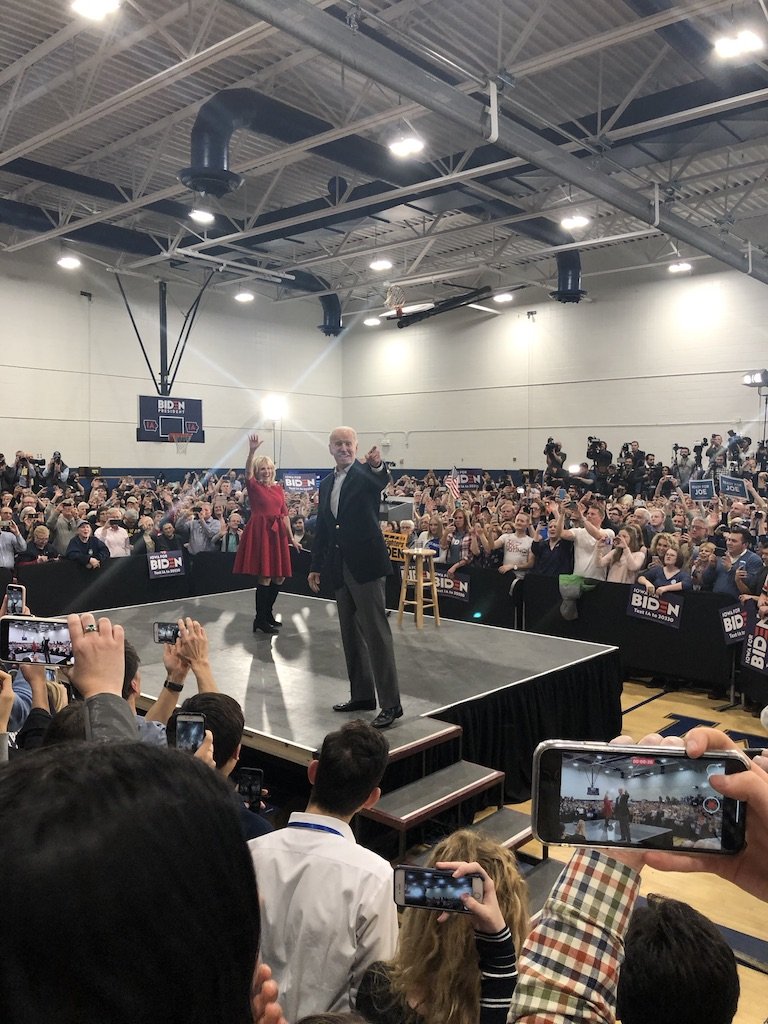Emersonians Got First-Hand Look at Iowa Caucus (Debacle and All)
Julia Stanton ’21 was one of several Political Communication students who travelled to attend and observe the Iowa Caucus. She shared what it was like to see all of the candidates, the comings and goings, and the unfortunate app mishap.
Monday night’s results fiasco put a black eye on the Iowa Caucus, just as many of us were witnessing the process for the first time.
It was simultaneously dysfunctional and magical, chaotic and inspiring. A Bernie Sanders precinct captain and a Pete Buttigieg precinct captain chatted like old friends, arguing policy without underlying their words with malice. Elizabeth Warren’s team called out to Andrew Yang supporters, asking them to caucus for her. The Yang supporters just left the room, refusing to vote if they couldn’t vote for their first pick.

Clearly, sometimes things don’t go the way we plan. Results are stalled, and candidates that are winning in the polls can plummet to fourth or fifth place. After my trip with a group of Emerson Political Communication students to Iowa, I’m not a caucus romantic. I see the problems the system poses. During the weeks leading up to the Iowa Caucus, the state becomes the campaign trail, and voters become valued friends and allies to the people who need them most – the candidates.
On the first day of our trip, we staggered from the airport to hear U.S. Congresswoman Ayanna Pressley speak on behalf of Elizabeth Warren. Pressley, a self-proclaimed “proud Democrat since she was in utero,” is a powerful speaker. Looking around I could see the Warren supporters nod and listen intently. Pressley painted a picture to Iowans who may not have ever met Warren, a woman who never let anything compromise her values and her dedication to her constituency.
“We outwork, we out organize, and we outlast,” Pressley reminded the canvassers amidst cheers. Naming Elizabeth Warren her “partner in good.”
Meeting Pressley, a role model for many of us, was just the first in a series of events that highlighted the specialness of the Iowa Caucus process. The more intimate events were so much more meaningful than I expected. At a free Bon Iver concert hosted by Bernie Sanders I was standing with a crowd of hundreds of young Bernie fans, with the stage just barely visible but I couldn’t stop thinking about Ayanna Pressley standing with all of us in a stranger’s home, talking with us as equals.

Part of the magic of the road to the Iowa Caucus is that there are surprises around every corner. The news arrived around dinner time that Warren had boarded a flight from Washington D.C. immediately after voting to remove President Donald Trump from office, and was on her way to the bar Peace Tree Brewing. In a frenzy we made our way there, feeling a nearly electric sense of excitement. Many of us were about to meet our presidential pick for the first time, something that in my home state of Maine and most other places would have been a one in a million opportunity. Talking to the locals, however, proved to me that this was business as usual on the Iowa campaign trail. For many, if they didn’t meet a candidate and hear them speak in person, they simply didn’t have enough information to make their choice of who to caucus for. The rest of us, especially in solidly blue states or states with just a few electoral votes, have to get by on dramatized TV ads and exhausting debates.
Elizabeth Warren spoke at 10:30 pm, and I instantly knew that battling my tiredness had been worth it. Seeing someone you’ve watched on TV for years right in front of you is a surreal experience, and one I’ll never forget. Warren’s charisma and down to earth realness made us all feel as if we were alone in a room with her, and yet the throng of people and the unique feeling of togetherness reminded us otherwise.
Later on, I expected the photo line to feel forced, but as I took Warren’s hand and introduced myself, she treated me like a friend and an equal. She was smaller than I expected, as she landed a heavy pat on my shoulder and called both of us as strong women who will get it done. To me, the “it” she mentioned was an equitable and just world for all. Of course, conquering a selfie line might have been implied as well.
Candidates Make Their Pitches

The next morning, we found ourselves at a pizza place, where we thought Tom Steyer was doing a meet and greet. It was actually a huge mistake on the part of his campaign, as the event was intended for union members only. The restaurant was dead silent while he made a private speech in a room his supporters weren’t allowed into. Compared to our first events in Iowa, this one felt stilted, a faux Iowa retail politics experience. Eventually Steyer came out and spent just a few minutes taking photos. His staffers rushed everyone through the process and herded potential caucusers around tensely. A fellow Emersonian told me they felt unwelcome, which is a really bad way to make voters feel. But it turned out that both Jill Biden and Bernie Sanders were also making appearances at the union event, so we camped out and were granted brief sightings of both.
The next days leading up to the caucus felt like one long push to the finish line. We experienced a Yang rally that sounded rather like a TED Talk. “I am barely a politician, I am an entrepreneur who started a nonprofit that created tens of thousands of jobs in the Midwest and the South,” said Yang, but the enthusiasm of his supporters failed to come through in the caucus results.
Amy Klobuchar had a packed rally in a high school gym that was attended by an older crowd. She kept her speech very focused on beating Trump. Her more moderate Democratic base was energized by that kind of talk, and got a taste of her policy as well. Although Klobuchar talked Midwest politics like no other candidate, she didn’t quite reach viability in many crucial caucuses. In meeting her, I found her to be very approachable and genuine. I continued to think about how valuable it was to see her face to face, and how lucky Iowa voters are to have that kind of experience.
Pete Buttigieg’s rally was incredibly well organized, as if he took extra effort to prove to voters that his lack of experience compared to other candidates was a non-issue. His hard work paid off, while Biden’s rally actually hurt his standing with some Iowa voters. Iowans we talked to said his unclear speech, reading from a binder, and his inability to respond to a comment from a protestor about his fossil fuel money put them in a difficult position. They had been Biden supporters, and less than two days before the caucus were changing their minds.
Elizabeth Warren took the time before her rally in Indianola to speak to the vast overflow section, instead of sending them home, ensuring that 1,000 voters could hear her speak, instead of just the 350 who made it into the room. In each room, she told voters to get in the fight.
The Caucus Process Unfolds…and Unravels
Sitting in a middle school gym in Ames, Iowa, with other Emerson students, I watched the caucus process unfold. I was surprised at how civil it all was, considering the charged nature of the political arena, and the vast differences in candidate preference in the room. Precinct captains from each candidate were talking and sharing ideas, while supporters cheered if they got a new body in their section of the bleachers. Undecideds were courted intensely, but there were no hard feelings if they decided to stand with a different candidate. In our precinct, Warren and Sanders became viable in the first round, or alignment, of the caucus, while Buttigieg barely managed to make viability in the second alignment, thanks to a few Klobuchar supporters who were searching for their second choice pick.
The utmost effort just to convince one person to support a candidate showed me that every vote matters in a tangible way. The pride voters had in standing publicly for their candidates was a far cry from the privacy of primary voting, and the discourse and collaboration between groups was a welcome change from the current state of tension in our political system.
Despite the mistakes made in reporting the results on Monday night, I still feel like we witnessed a little piece of magic. The problems with the caucus system loom over the heads of Iowans especially, and threaten to change their process for good. No matter what ends up happening, I am hoping that the intimate and personal interactions with candidates don’t disappear from the Iowa political scene. On the campaign trail, candidates become flesh and blood for Iowa voters, and appear to them as neighbors, advocates, and humble servants of democracy.
Categories